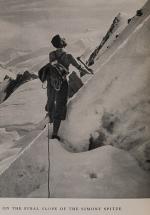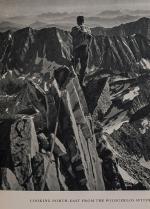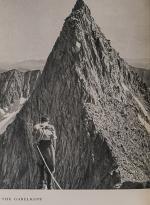Smythe, Over Tyrolese Hills.
Over Tyrolese Hills. Photographs by the Author.
London, Hodder & Stoughton, no year (c.1937). 15 cm x 22.5 cm. Frontispiece, XV, 292 pages. 35 other illustrations. Fold-out map at rear showing the Tyrolese Alps. Hardcover [publisher’s original blue cloth] with lettering on spine. Vignette on front board. Very good+ condition with only minor signs of external wear. Very minor foxing to edges. Interior very bright and clean with sharp corners.
This books describes a traverse of the Eastern Alps from Bludenz to Zell am See.
Includes, for example, the following: The Stubai Alps / Innsbruck / The Zillertal Alps/ The Reichen Range / The Hohe Tauern: The Gross Venediger etc.
An account of Smythe’s experiences in Austria, and in particular in Tyrol. He first visited Austria in 1921 when it and was suffering from terrible economic and social upheavals following the defeat in the Great War and the resultant collapse of the Hasburg empire. Witnessing the hardships of the civilians was instructive for the sympathetic Smythe: “Austria taught me something for which I am grateful. A man’s house, his living, his occupation and his wealth may crumble about him, but hope can withstand the hardest thrusts of fate.” (p.xi)
Smythe’s appreciation of the particular charms of Tyrol leap from the page. “Beauty and grandeur there are in full measure in Tyrol. It is a country for the wanderer. Mountain travel in the Himalayas has wedded me to mountain wandering. Climb mountains from a centre if you will, but consummate your love for the hills by wandering across them. Cross their passes and traverse their peaks. Climb upwards out of valley in the dawn and descend into another valley in the evening. Then you will taste the very essence of travel, this queer desire that sends a man so far – he knows not why. This essence is so elusive as to be indescribable in words. You taste it when the last steep slope of the pass is beneath you and the blue distances spring upwards to your vision; you taste it in the dawn when, rucksack on your back, you set out in the keen pine air and feel the rocky hillside beneath your eager feet, and you feel it in the evening when you sit at peace over your glass of wine in some little inn, content to know the pleasant languor of fatigue. For me, and I hope who read this book, the Austrian Tyrol will remain a country for the wanderer, and all who rejoice in the beauty and freedom of the hills.” (p.xv)
In thoughtful passages that chime with contemporary concerns about the increasing support for far-right political movements across the West, Smythe also has a lot to say about the then-current political and economic conditions with Austria and the growing ultra-nationalism and “Nazi element” among the public. “The Nazi doctrine in Austria is a doctrine of inferiority and despair…The Anschluss is a doctrine of material expediency alone, which ignores sentimental and spiritual values….There is no doubt that an absorption by Germany of Austria would, at the present stage of Austrian development, bring much unhappiness and strife in its train.” Blaming the harsh peace imposed by the Allied on the economic maladies that were feeding the growth of the Nazi movement, Smythe asserted that the terms of peace agreements would have to be adjusted to ameliorate Austria’s plight. “In Austria it boils down to the economic factor. A prosperous country seeks no racial or political solution to troubles that do not exist. Remove the cancert of poverty and raise the standard of living in Austria, and pride of race and individuality are automatically re-established.” The stakes, the author tells us are high: “One thing is certain. If something is not done to restore national pride and self-esteem in Austria by improving her economic situation, it is certain that Austria will throw in her lot with Germany sooner or later, with possibly disastrous results to the peace of Europe. Austria is the touch-hole of Europe and the flaming match is very near.” (pp.148-150)
Francis Sydney Smythe, better known as Frank Smythe or F. S. Smythe (1900 – 1949), was a leading English mountaineer, author, photographer and botanist. He is best remembered for his mountaineering in the Alps as well as in the Himalayas, where he identified a region that he named the “Valley of Flowers”, now a protected park. His ascents include two new routes on the Brenva Face of Mont Blanc, Kamet, and attempts on Kangchenjunga and Mount Everest in the 1930s (Wikipedia).
At the time that Smythe climbed it, Kamet was the highest peak to have been scaled. Smythe’s expeditions resulted in several notable works on mountaineering such as The Kanchenjunga Adventure and Kamet Conquered.
- Keywords: 1930s · Alps · Austria · climbing · Expeditions · Hiking · Hillwalking · Mountaineer’s Mountain · Mountaineering · Mountaineering – Collection · Mountaineering – Rare · Mountaineers · Mountains · Nature · Outdoors · Travel · Travel and Adventure · Travel Guide · Travel Writing · Travel-Guide · Tyrol
- Language: English
- Inventory Number: 120107AB
EUR 68,--
© 2025 Inanna Rare Books Ltd. | Powered by HESCOM-Software
















